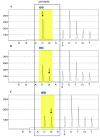Investigating the association between polymorphisms in connective tissue growth factor and susceptibility to colon carcinoma
- PMID: 25502877
- PMCID: PMC4337474
- DOI: 10.3892/mmr.2014.3083
Investigating the association between polymorphisms in connective tissue growth factor and susceptibility to colon carcinoma
Abstract
There have been numerous studies on the gene expression of connective tissue growth factor (CTGF) in colorectal cancer, however very few have investigated polymorphisms in this gene. The present study aimed to determine whether single nucleotide polymorphisms (SNPs) in the CTGF gene are associated with a higher susceptibility to colon cancer and/or an invasive tumor growth pattern. The CTGF gene was genotyped for seven SNPs (rs6918698, rs1931002, rs9493150, rs12526196, rs12527705, rs9399005 and rs12527379) by pyrosequencing. Formalin‑fixed paraffin‑embedded tissue samples (n=112) from patients diagnosed with colon carcinoma, and an equal number of blood samples from healthy controls, were selected for genomic DNA extraction. The complexity index was measured using images of tumor samples (n=64) stained for cytokeratin‑8. The images were analyzed and correlated with the identified CTGF SNPs and clinicopathological parameters of the patients, including age, gender, tumor penetration, lymph node metastasis, systemic metastasis, differentiation and localization of tumor. It was demonstrated that the frequency of the SNP rs6918698 GG genotype was significantly associated (P=0.05) with an increased risk of colon cancer, as compared with the GC and CC genotypes. The other six SNPs (rs1931002, rs9493150, rs12526196, rs12527705, rs9399005 and rs12527379) exhibited no significant difference in the genotype and allele frequencies between patients diagnosed with colon carcinoma and the normal healthy population. A trend was observed between genotype variation at rs6918698 and the complexity index (P=0.052). The complexity index and genotypes for any of the studied SNPs were not significantly correlated with clinical or pathological parameters of the patients. These results indicate that the rs6918698 GG genotype is associated with an increased risk of developing colon carcinoma, and genetic variations at the rs6918698 are associated with the growth pattern of the tumor. The present results may facilitate the identification of potential biomarkers of the disease in addition to drug targets.
Figures



Similar articles
-
Polymorphisms in the CLDN1 and CLDN7 genes are related to differentiation and tumor stage in colon carcinoma.APMIS. 2014 Jul;122(7):636-42. doi: 10.1111/apm.12211. Epub 2014 Jan 31. APMIS. 2014. PMID: 24479816
-
Association of CASP8 rs3834129 and CTGF rs6918698 genotypes with susceptibility to colorectal cancer in a Mexican population.Cell Mol Biol (Noisy-le-grand). 2024 Nov 27;70(11):6-15. doi: 10.14715/cmb/2024.70.11.2. Cell Mol Biol (Noisy-le-grand). 2024. PMID: 39707786
-
Association between a CTGF gene polymorphism and systemic sclerosis in a French population.J Rheumatol. 2010 Feb;37(2):351-8. doi: 10.3899/jrheum.090290. Epub 2009 Dec 23. J Rheumatol. 2010. PMID: 20032097
-
Connective Tissue Growth Factor Single Nucleotide Polymorphisms in (Familial) Pulmonary Fibrosis and Connective Tissue Disease Associated Interstitial Lung Disease.Lung. 2021 Dec;199(6):659-666. doi: 10.1007/s00408-021-00494-y. Epub 2021 Nov 23. Lung. 2021. PMID: 34812907
-
The Genetic Polymorphisms in Colon Cancer.Crit Rev Oncog. 2020;25(4):405-415. doi: 10.1615/CritRevOncog.2020035957. Crit Rev Oncog. 2020. PMID: 33639065 Review.
Cited by
-
The CCN2 Polymorphism rs12526196 Is a Risk Factor for Ascending Thoracic Aortic Aneurysm.Int J Mol Sci. 2022 Dec 6;23(23):15406. doi: 10.3390/ijms232315406. Int J Mol Sci. 2022. PMID: 36499730 Free PMC article.
-
Single nucleotide variants around the connective tissue growth factor (CTGF/CCN2) gene and their association with multiple sclerosis risk, disability scores, and rate of disease progression.Neurol Sci. 2022 Jun;43(6):3867-3877. doi: 10.1007/s10072-021-05852-5. Epub 2022 Jan 29. Neurol Sci. 2022. PMID: 35091888
-
A clinical model to predict the risk of synchronous bone metastasis in newly diagnosed colorectal cancer: a population-based study.BMC Cancer. 2019 Jul 17;19(1):704. doi: 10.1186/s12885-019-5912-x. BMC Cancer. 2019. PMID: 31315606 Free PMC article.
-
Association of Polymorphisms in Connective Tissue Growth Factor and Epidermal Growth Factor Receptor Genes With Human Longevity.J Gerontol A Biol Sci Med Sci. 2017 Aug 1;72(8):1038-1044. doi: 10.1093/gerona/glw116. J Gerontol A Biol Sci Med Sci. 2017. PMID: 27365368 Free PMC article.
References
-
- Brigstock DR. The connective tissue growth factor/cysteine-rich 61/nephroblastoma overexpressed. Endocr Rev. 1999;20:189–206. - PubMed
-
- Dhar A, Ray A. The CCN family proteins in carcinogenesis. Exp Oncol. 2010;32:2–9. - PubMed
-
- Chen YQ, Sloan-Lancaster J, Berg DT, et al. Differential mechanisms of plasminogen activator inhibitor-1 gene activation by transforming growth factor-beta and tumor necrosis factor-alpha in endothelial cells. Thromb Haemost. 2001;86:1563–1572. - PubMed
Publication types
MeSH terms
Substances
LinkOut - more resources
Full Text Sources
Other Literature Sources
Research Materials
Miscellaneous

